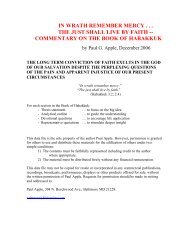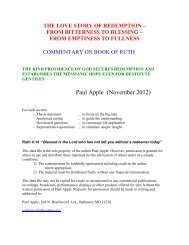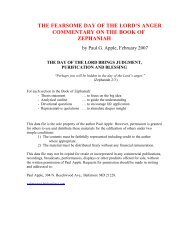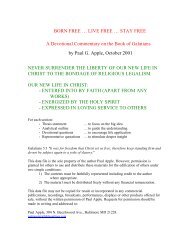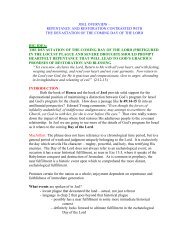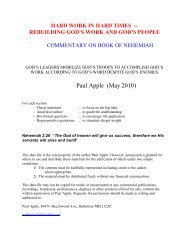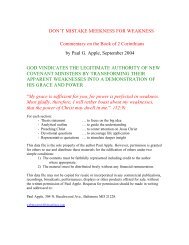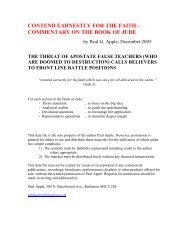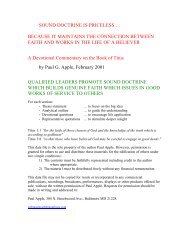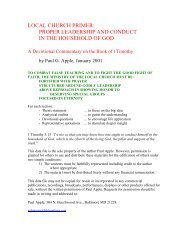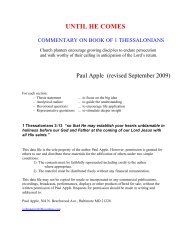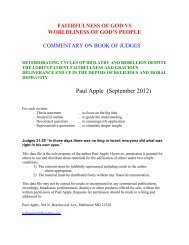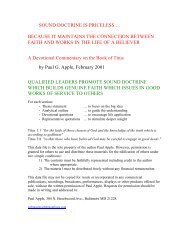Amos - Free sermon outlines, Bible study and
Amos - Free sermon outlines, Bible study and
Amos - Free sermon outlines, Bible study and
You also want an ePaper? Increase the reach of your titles
YUMPU automatically turns print PDFs into web optimized ePapers that Google loves.
James D. Nogalski: Taken as a group, one should note the climactic order of the oracles. Theindictments proceed against foreign countries, but the order in which the countries are mentionedencircles Israel as a means of accenting the transgression of YHWH’speople.http://www.galaxie.com/article.php?article_id=8224 - GRE92B023#GRE92B023 By placing theoracles against Judah <strong>and</strong> Israel at the end of the cycle, <strong>Amos</strong> 1:3–2:16 deliberately saves theworst for last. <strong>Amos</strong> preached to the Northern Kingdom (Israel), <strong>and</strong> ancient readers/hearers ofthese oracles would have wholeheartedly concurred with YHWH’s judgment against foreignl<strong>and</strong>s. However, they would have been surprised when the judgment turned against them. Subtly,the text conveys an extremely important theological concept. YHWH’s people must adhere to thesame st<strong>and</strong>ards of conduct as those who are outside the immediate community. In fact, theseoracles reflect greater expectations for Judah <strong>and</strong> Israel because of their relationship to YHWH.The oracles of <strong>Amos</strong> 1:3–2:16 remind us about the danger of recognizing the sins of others whilebeing blind to our own (cf. Matt 7:3–5; Luke 6:41–42).http://www.galaxie.com/article.php?article_id=8224Constable: There are four sections to this oracle: Israel's recent sins, God's past gracious activityon Israel's behalf, Israel's response, <strong>and</strong> Israel's punishment.Israel's recent sins 2:6-8God's past grace 2:9-11Israel's response to God's grace 2:12Israel's consequent punishment 2:13-16II. (3:1 - 6:14) THREE MESSAGES OF CONDEMNATION AGAINST ISRAELKey introductory phrase: "Hear ye this word!” [3:1; 4:1; 5:1]J. Sidlow Baxter: [following his outline in this section]Each of them is divided by an emphatic “therefore,” so that in each we have, in the first part,judgment deserved, <strong>and</strong> in the remainder, judgment decreed . . .The first of these addresses declares the fact of Israel’s guilt in the present. The second stressesIsrael’s sin in the past (see verses 6 to 11, which recount Jehovah’s repeated but unavailingchastenings of Israel, <strong>and</strong> note the five-times occurring mournful refrain, “Yet have ye notreturned unto Me, saith Jehovah” – verses 6, 8, 9, 10, 11). The third address stresses thepunishment of Israel’s sin in the future (see v. 1-3 <strong>and</strong> v. 16 to vi. 14). Note the vehemence <strong>and</strong>intensity at the end (vi. 9-14). Yet notice, also, in this third address, the eleventh hour warning inthe thrice-uttered appeal of Jehovah: “Seek ye Me, <strong>and</strong> ye shall live,” etc. (v. 4, 6, 14).Note further about these three addresses that in the first we see the principle underlying Divinejudgment – “You only have I known of all the families of the earth; therefore will I punish youfor all your iniquities” (iii. 2). This is the key verse of this book. <strong>Amos</strong> is the prophet ofjudgment for abused privilege. Judgment is always determined according to privilege. Increasedprivilege is increased responsibility. Israel had been supremely favoured, <strong>and</strong> therefore wassupremely responsible. Here is a solemn lesson for all of us to learn.In the second address we see the forbearance behind Divine judgment. Before the stroke of afinal major judgment is allowed to fall on the nation, there comes a succession of minorjudgments, to warn (iv. 6-11). It is when these are ignored <strong>and</strong> the Divine patience is outraged



